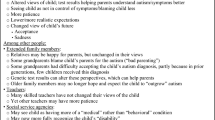Abstract
Recent advances in syndromic identification have resulted in genetic counselors providing services to increasing numbers of people with intellectual disability (ID) and their families. However, from the standpoint of professionals who support people with ID, genetic counselors are on the periphery of the extensive ID social service system. Reasons for this, based on a review of historical circumstances, definitional differences funding and a divergence of approaches, are critically presented and discussed. A model is offered that would allow for a closer working relationship and an integrated team approach that includes genetic counselors.
Similar content being viewed by others
References
Abbeduto, L. (2010). Introduction to special section on the National Fragile X survey. American Journal on Intellectual and Developmental Disabilities, 115, iii–iv.
American Association on Intellectual and Developmental Disabilities (AAIDD) Ad Hoc Committee on Terminology and Classification. (2010). Intellectual disability: Definition, classification, and systems of support. Washington, DC: AAIDD.
Bear, M. F. (2005). Therapeutic implications of the mGluR theory of fragile X mental retardation. Genes, Brain, and Behavior, 4, 393–398.
Bruder, M. B. (1994). Working with members of other disciplines: Collaboration for success. In M. Wolery & J. S. Wilbers (Eds.), Including children with special needs in early childhood programs (pp. 45–70). Washington, DC: National Association for the Education of Young Children.
Dent, K. M., Harper, C., Kearney, L., Lieber, C., & Finucane, B. (2011). Embracing the unique role of genetic counselors: response to the commentary by Madeo et al. American Journal of Medical Genettics Part A, 155, 1791–1793.
Down, J. L. (1862). Observations on an ethnic classification of idiots. London Hospital Reports, 3, 259–262.
Drew, C. J., & Hardman, M. L. (2000). Mental retardation: A life cycle approach (7th ed.). Upper Saddle River: Merrill.
Dykens, E. M., & Hodapp, R. M. (2001). Research in mental retardation: toward an etiologic approach. Journal of Child Psychology and Psychiatry, and Allied Disciplines, 42, 49–71.
Dykens, E. M., Hodapp, R. M., & Finucane, B. M. (2000). Genetics and mental retardation syndromes: A new look at behavior and interventions. Baltimore: Brookes.
Finucane, B., Haas-Givler, B., & Simon, E. W. (2003). Genetics, mental retardation, and the forging of new alliances. American Journal of Medical Genetics. Part C, Seminars in Medical Genetics, 117C, 66–72.
Goddard, H. H. (1912). The Kallikak family: A study in the heredity of feeble-mindedness. New York: Macmillan.
Griffiths, D. M., & Watson, S. L. (2004). Demystifying syndromes associated with developmental disabilities. In D. Griffiths & R. King (Eds.), Demystifying syndromes: Clinical and educational implications of common syndromes associated with intellectual disabilities (pp. 1–30). Kingston: National Association for the Dually Diagnosed.
Harris, J. C. (2002). Behavioral phenotypes of neurodevelopmental disorders: Portals into the developing brain. In K. L. Davis, D. Charney, J. T. Coyle, & C. Nemeroff (Eds.), Neuropsychopharmacology: The Fifth Generation of Progress (pp.625–638).
Hodapp, R., & Dykens, E. (1994). Mental retardation’s two cultures of behavioral research. American Journal on Mental Retardation, 98, 675–687.
Howe, S. G. (1848). On the Causes of Idiocy. In M. Rosen, G. Clark, & M. Kivitz (Eds.), The history of mental retardation: Collected papers (pp. 131–160). Baltimore: University Park Press.
Kerlin, I. N. (1890). The moral imbecile. In I. C. Barrows (Ed.), Proceedings of the seventeenth annual national conference of charities and correction (pp. 244–250). Boston: George H. Ellis.
Luckasson, R., Borthwick-Duffy, S., Buntinx, W. H. E., Coulter, D. L., Craig, E. M., Reeve, A., et al. (2002). Mental retardation: Definition, classification and systems of supports (10th ed.). Washington DC: American Association on Mental Retardation.
Madeo, A. C., Biesecker, B. B., Brasington, C., Erby, L. H., & Peters, K. F. (2011). The relationship between the genetic counseling profession and the disability community: a commentary. American Journal of Medical Genettics Part A, 155, 1777–1785.
Patient Protection and Affordable Care Act of 2010, 42 U.S.C. §§1001–10909 (2010).
Simon, E. W., & Finucane, B. (1998). Etiology and dual diagnosis: notes on a biologically based syndromic approach. The NADD Bulletin, 1, 63–65.
Wolfensberger, W. (1972). The principle of normalization in human services. Toronto: National Institute on Mental Retardation.
Wolfensberger, W. (1983). Social role valorization: a proposed new term for the principle of normalization. Mental Retardation, 21, 234–239.
Zigler, E. (1967). Familial mental retardation: a continuing dilemma. Science, 155, 292–298.
Zigler, E. (1969). Developmental versus difference theories of mental retardation and the problem of motivation. American Journal of Mental Deficiency, 7, 536–556.
Zigler, E., Balla, D., & Hodapp, R. (1984). On the definition and classification of mental retardation. American Journal of Mental Deficiency, 89, 15–230.
Author information
Authors and Affiliations
Corresponding author
Rights and permissions
About this article
Cite this article
Simon, E.W. Are Genetic Counselors and the Social Service System for People with Intellectual Disability Reaching Rapprochement?. J Genet Counsel 21, 777–783 (2012). https://doi.org/10.1007/s10897-012-9525-7
Received:
Accepted:
Published:
Issue Date:
DOI: https://doi.org/10.1007/s10897-012-9525-7




